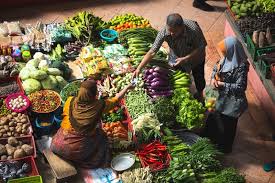Sustainable eating is more than just a passing trend; it’s a lifestyle choice that benefits personal health, the environment, and future generations. Unlike short-lived diet fads that focus on quick fixes, sustainable eating is about making informed food choices that nourish the body while minimizing harm to the planet. This approach encourages mindful consumption, considering factors like nutrient density, food production methods, and environmental impact.
The key to adopting a sustainable diet is focusing on whole, minimally processed foods that are locally sourced and grown using eco-friendly practices. This means selecting seasonal fruits and vegetables, supporting organic farming, and reducing reliance on industrially produced foods. By prioritizing such choices, individuals contribute to a healthier body and a healthier planet.
The Health Benefits of Sustainable Eating
One of the major benefits of sustainable eating is its positive impact on health. Eating a balanced diet rich in whole foods ensures an adequate intake of essential nutrients, vitamins, and minerals. Whole grains, legumes, fresh fruits, and vegetables provide necessary fiber, which aids digestion and promotes gut health. Meanwhile, lean proteins, healthy fats, and plant-based alternatives offer long-lasting energy and reduce the risk of chronic diseases.
Moreover, sustainable eating emphasizes quality over quantity. Instead of overconsuming processed foods high in sugar, unhealthy fats, and artificial additives, individuals can focus on nutrient-dense options that support long-term wellness. This dietary shift has been linked to lower risks of heart disease, obesity, diabetes, and other lifestyle-related illnesses.
Reducing Food Waste Through Mindful Consumption
Food waste is a significant global issue, contributing to environmental degradation and unnecessary resource depletion. Sustainable eating involves making conscious efforts to minimize food waste by planning meals carefully, storing food properly, and repurposing leftovers creatively.
Simple steps such as buying only what is needed, understanding expiration labels correctly, and composting organic waste can make a substantial difference. Additionally, incorporating “root-to-stem” and “nose-to-tail” eating habits—where all edible parts of produce and animal products are utilized—helps reduce waste and maximize nutritional benefits.
The Environmental Impact of Sustainable Eating
Industrial food production significantly contributes to greenhouse gas emissions, deforestation, and water pollution. By choosing sustainably sourced foods, consumers can actively reduce their carbon footprint. For instance, opting for locally grown produce reduces transportation emissions, while supporting regenerative agriculture promotes soil health and biodiversity.
Another crucial aspect of sustainable eating is reducing meat consumption. The meat industry is a leading contributor to environmental issues such as deforestation and excessive water use. Adopting a more plant-based diet or integrating sustainable seafood and ethically raised meat into meals can lessen ecological harm while still providing essential nutrients.
Sustainable Eating on a Budget
A common misconception is that sustainable eating is expensive. However, with strategic planning, it is possible to eat sustainably without breaking the bank. Buying in bulk, cooking at home, and prioritizing seasonal produce are cost-effective ways to maintain a sustainable diet. Additionally, exploring local farmers’ markets and community-supported agriculture (CSA) programs can provide fresh, affordable, and ethically sourced ingredients.
Reducing reliance on packaged and processed foods not only saves money but also enhances nutritional intake. Learning simple recipes and meal-prepping techniques ensures that meals are healthy, sustainable, and economical.
The Role of Ethical Food Choices

Beyond personal health, sustainable eating aligns with ethical food practices. Supporting fair-trade products, sustainable fisheries, and humane farming methods ensures that food production respects workers’ rights, animal welfare, and environmental conservation. Reading food labels, researching brands, and staying informed about industry practices help consumers make responsible choices that align with their values.
Ethical food choices also extend to reducing reliance on single-use plastics and excessive packaging. Opting for reusable bags, glass containers, and bulk shopping can significantly decrease plastic waste and promote a circular economy.
Embracing a Sustainable Eating Mindset
Transitioning to sustainable eating is not about perfection but about making consistent, mindful choices that align with long-term well-being. Start by making small changes, such as incorporating more plant-based meals, shopping locally, and reducing food waste. Over time, these habits become second nature and contribute to a healthier lifestyle and planet.
Education and awareness play a crucial role in sustainable eating. Engaging with community initiatives, following ethical food brands, and sharing knowledge with others can amplify the impact of these efforts. The more people embrace this lifestyle, the greater the collective influence on global food systems.
Final Thoughts
Sustainable eating is not just a dietary approach but a long-term commitment to health, ethics, and environmental responsibility. By making informed food choices, individuals can nourish their bodies while protecting the planet for future generations. Whether through reducing food waste, supporting ethical farming, or prioritizing nutrient-rich whole foods, every effort toward sustainable eating contributes to a healthier world.
Making the shift to sustainable eating may take time, but the benefits are well worth it. With each conscious decision, individuals can cultivate a more sustainable, fulfilling, and health-focused lifestyle—one meal at a time.
